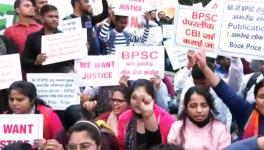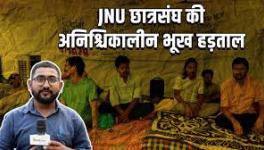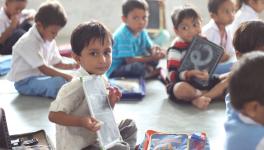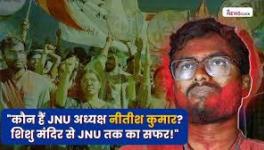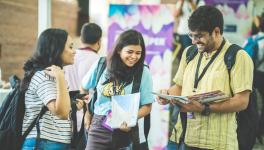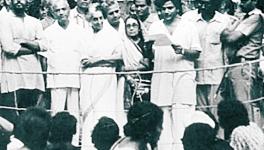‘JNU Instils Hope in Us, the Administration Can’t Snatch it Away’
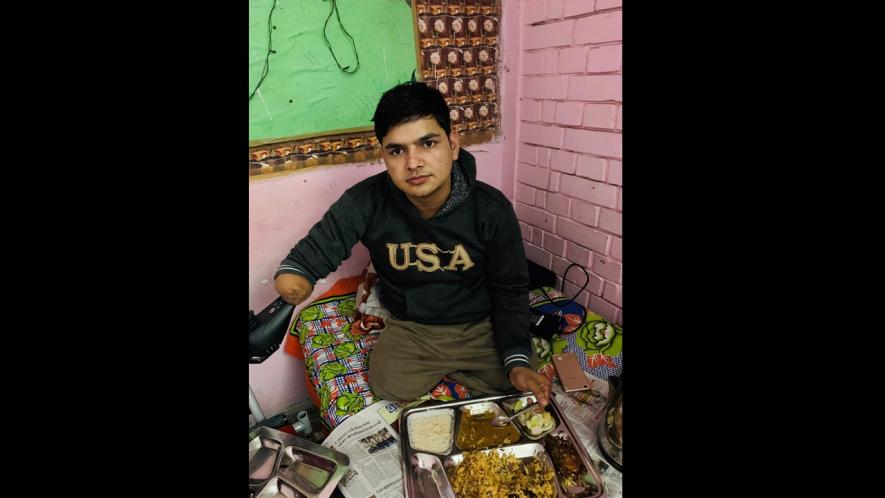
New Delhi: It’s day three of the CRPF entering the campus. A group of three undergraduate students is busy gossiping while sipping tea outside a tea stall nestled in the cluster of Kaveri, Periyar and Godavari Hostels in Jawaharlal Nehru University (JNU). A random chat soon changes into an animated discussion on the next course of action for students protesting the massive hike in hostel and mess charges and other measures under the new hostel manual passed by Inter Hall Administration.
Hours before one overheard this conversation, JNU witnessed some dramatic moments leading to provosts of five hostel khands (blocks) succumbing to the mounting pressure by protesting students. While the provosts of Uttarakhand and Poorvanchal blocks resigned after hours-long deliberations, the provosts of Paschimabad- I, Paschimabad- II, Dakshinapuram rejected the hostel manual.
In one of the letters, Prof. Bhaswati Das, Provost of Dakshinapuram khand, said, she was "rejecting on the objected clauses mentioned in the petition." The petition, drafted by the JNU Students Union, said that the manual would have a drastic impact on the nature of the university and a fresh manual should be prepared in consultation with the stakeholders, including students, hostel presidents and JNUSU.
The furore over the hostel manual began after several hostel presidents alleged that they were not allowed in the meeting of the Inter Hall Administration, denying them any chance of representation while finalising the manual.
Nadeem Ahmad, Acting President, Kaveri Hostel, spoke about what transpired in one of the meetings where provosts, hostel presidents and wardens met to discuss the manual. Nadeem said: "The provosts and wardens told me informally that even they were not involved in the passing of the manual. The students had gathered outside the meeting venue. We were quite clear that the manual cannot be passed in this manner. While it took a lot of deliberations and highlighting of several cases of students who come from humble backgrounds to get the manual rejected, we eventually succeeded."
Nadeem, an M.A Second-Year student of Arabic, cites the example of a few students to highlight the disastrous impact of the fee hike on students from socially oppressed sections, especially the physically disabled ones. “We have held a general body meeting for one of the students who could not afford his studies. The residents of the hostel resolved to pay additional money per resident to support this student in pursuing his studies. The administration must understand that JNU is not a university. It's a community where students learn from each other and can go to any extent to support each other in realising their dreams."
Farooque Alam, a student of Ph.D in Russian Studies, nods his head in approval. Alam recalls his journey from his home Katihar in Bihar. “I was very young when I was hit by polio. The disease left an irreversible impact on my body. My father is a farmer and barely earns his livelihood. I was first enrolled in a madarsa. Impressed by my marks, my teacher recommended my father to enrol me in a Navodaya School. He provided my registration form. I received my education till class 12th. Afterwards, I enrolled in Chemistry Honours at Kirori Mal College, Delhi University. On an average, it cost almost Rs 12,000 per month to support my expenses. After studying first year, I decided to drop out from the course, as I could not afford it further. I came to JNU and enrolled in B.A (Hons) Russian Studies. Now, I am pursuing my Ph.D just because this university supported me when I needed it the most. This is a university which supports those backward students about whom the rest of India does not give a damn," he says.
A few meters away from Kaveri Hostel, a bunch of students is sitting on a bench in front of the Sabarmati Hostel. Most of the students are from the Centre for Social Medicine and Community Health. A conversation with the group reveals another realm of research often ignored in the coverage of the university. Kaushik Mahto, an M.Phil student at the Centre, says: "Scientists at our Centre recently discovered new ways to treat tuberculosis within a month. This is a scientific breakthrough. But a perception is being created through false propaganda that this university shelters only divisive elements." The discussion soon delves into exclusion that is likely to take place after implementation of the manual.
Mahto, hailing from Purulia district in West Bengal, says he is the first-generation learner in his family. Elaborating on the situation faced by many research scholars, he says: "We hardly survive on Merit Cum Means Scholarship and Non-NET scholarship. Sometimes, we get these scholarships at the end of term. We could study and conduct research just because we did not have to bother about fee and other expenses. JNU used to get a good amount of money from application forms, which was eventually distributed among students in the form of Merit Cum Means Scholarship. The administration argues it is facing a crunch of funds. So, why did it pass its responsibility to the National Testing Agency which charges university in crores?"
Kamlesh, a Ph.D student at the Centre, who quit his job to pursue studies, speaks about the non-discriminatory behaviour of fellow students. "I had Rs 35,000 in my provident fund account. I needed to withdraw it from the account to support my studies...the most astonishing part about JNU is that it hardly makes a difference to my friends if I am a dalit. They know about exclusion and oppression. Outside the campus, it is entirely different as you are reduced to your mere identity," he says.
During the conversation, this reporter received a call from one of the residents of Kaveri Hostel to meet another physically challenged student, Suraj Tiwari.
Back to Kaveri Hostel, we met Suraj, a student of B.A (H) Russian Studies, who lost both legs, a hand and three fingers of the second hand in a tragic train accident. Narrating his story, he says, “I belong to a lower income class family based in Mainpuri in Uttar Pradesh. In January 2017, I fell from a running train. I lost my legs and hands. I was in trauma after my accident. I thought my elder brother would support the family. But I lost my brother in a bike accident. The incident completely ruined my family. Even I was contemplating suicide. During my treatment at All India Institute of Medical Sciences, Delhi, I met Akshansh Gupta, who is a research scholar at the university. Even after suffering from acute cerebral palsy, he inspired me to apply in JNU. I explained to him about my financial condition. He bought me books for my preparation. I applied but could not get through. I lost all hope, but he kept me motivated. Fortunately, I got another opportunity in December when the university announced its entrance exams owing to some delay. I prepared for it and finally got admitted. When I entered the campus, the belief that life still had a lot to offer, became strong in me. The university offered me scholarship and additional Rs 3,000 for my escort. It offered me a special chair which I can operate hassle free. I get a chair reserved in the library for me. The list is huge. No other university in India offers this."
Talking about the impact of the manual, Suraj says: "My father is a labourer. I do not know if my family has something to eat or whether they will sleep on an empty stomach. I want to be an Indian Administrative Services officer. I want to run and hope I can do it with the help of blades. I can imagine all this only because this university provides affordable education to students like me. The administration must understand that this university instils hope and it can’t snatch it from us."
Get the latest reports & analysis with people's perspective on Protests, movements & deep analytical videos, discussions of the current affairs in your Telegram app. Subscribe to NewsClick's Telegram channel & get Real-Time updates on stories, as they get published on our website.











